mirror of
https://github.com/bevyengine/bevy
synced 2024-11-23 05:03:47 +00:00
10 commits
| Author | SHA1 | Message | Date | |
|---|---|---|---|---|
|
|
17f045e2a0
|
Delay asset hot reloading (#8503)
# Objective - Fix #5631 ## Solution - Wait 50ms (configurable) after the last modification event before reloading an asset. --- ## Changelog - `AssetPlugin::watch_for_changes` is now a `ChangeWatcher` instead of a `bool` - Fixed https://github.com/bevyengine/bevy/issues/5631 ## Migration Guide - Replace `AssetPlugin::watch_for_changes: true` with e.g. `ChangeWatcher::with_delay(Duration::from_millis(200))` --------- Co-authored-by: François <mockersf@gmail.com> |
||
|
|
aefe1f0739
|
Schedule-First: the new and improved add_systems (#8079)
Co-authored-by: Mike <mike.hsu@gmail.com> |
||
|
|
db2fd92385 |
Make ktx2 and zstd default features (#7696)
# Objective - Environment maps use these formats, and in the future rendering LUTs will need textures loaded by default in the engine ## Solution - Make ktx2 and zstd part of the default feature - Let examples assume these features are enabled --- ## Changelog - `ktx2` and `zstd` are now party of bevy's default enabled features ## Migration Guide - If you used the `ktx2` or `zstd` features, you no longer need to explicitly enable them, as they are now part of bevy's default enabled features |
||
|
|
f1c69b925e |
don't require features on examples where it's not the main focus (#7615)
# Objective - Required features were added to some examples in #7051 even though those features aren't the main focus of the examples - Don't require features on examples that are useful without them ## Solution - Remove required features on examples `load_gltf` and `scene_viewer`, but log a warning when they are not enabled |
||
|
|
dd4299bcf9 |
EnvironmentMapLight, BRDF Improvements (#7051)
(Before) 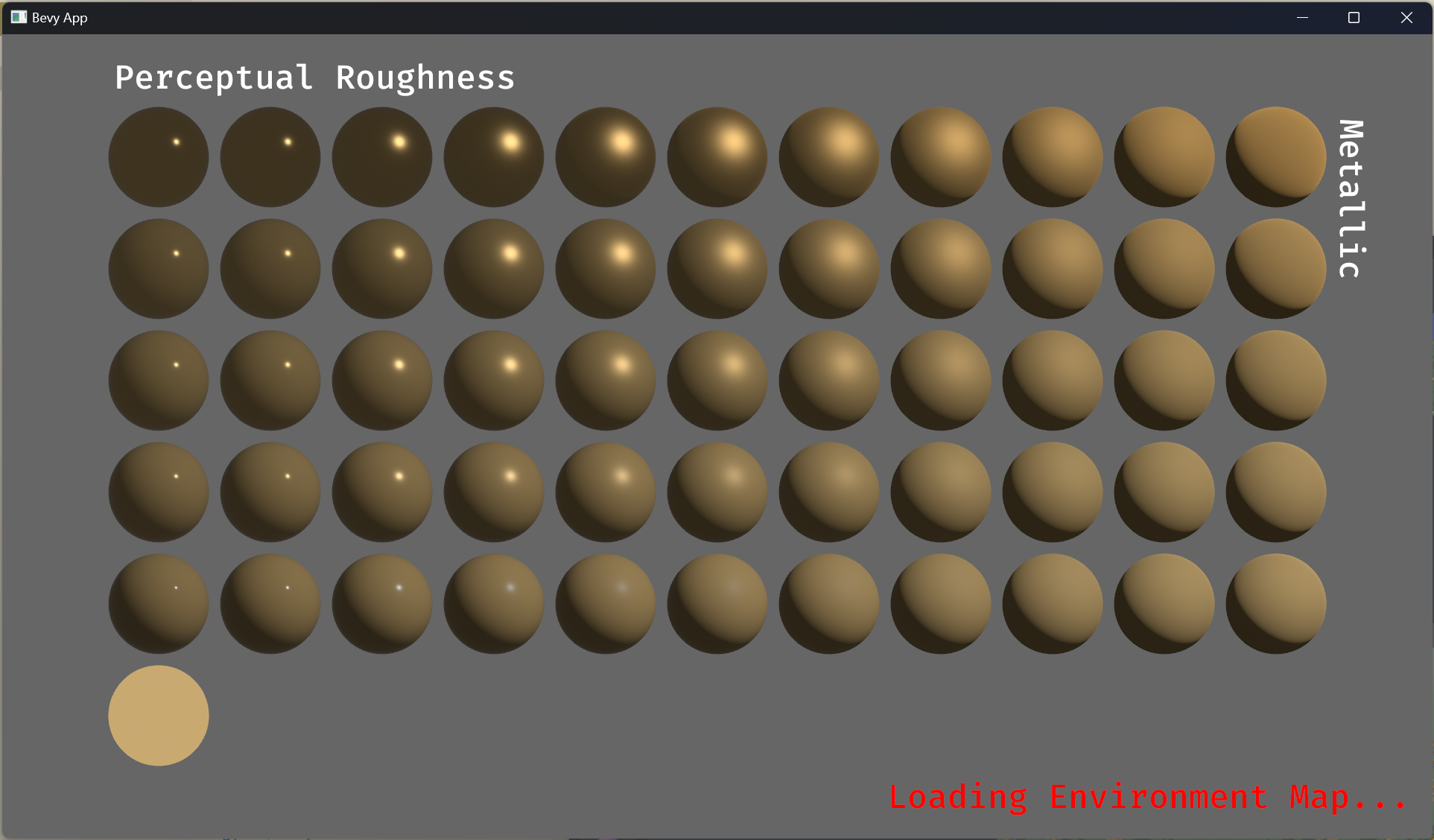 (After) 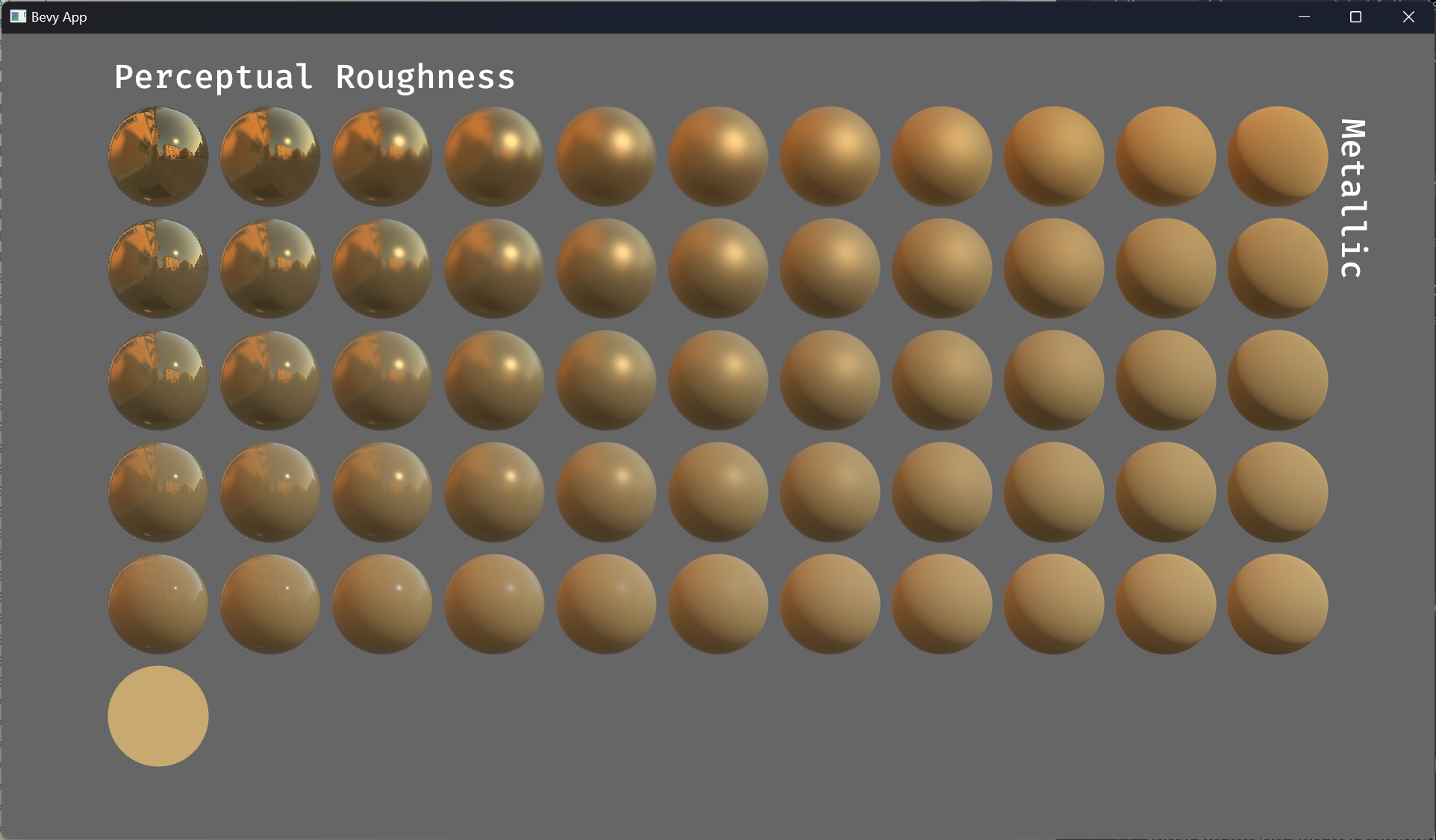 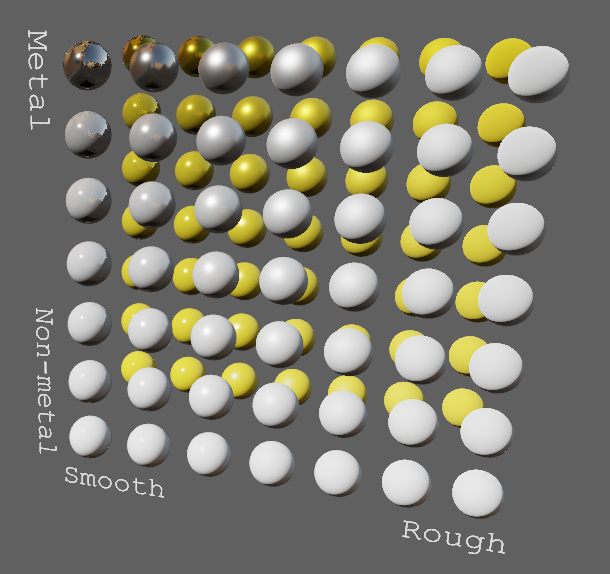 # Objective - Improve lighting; especially reflections. - Closes https://github.com/bevyengine/bevy/issues/4581. ## Solution - Implement environment maps, providing better ambient light. - Add microfacet multibounce approximation for specular highlights from Filament. - Occlusion is no longer incorrectly applied to direct lighting. It now only applies to diffuse indirect light. Unsure if it's also supposed to apply to specular indirect light - the glTF specification just says "indirect light". In the case of ambient occlusion, for instance, that's usually only calculated as diffuse though. For now, I'm choosing to apply this just to indirect diffuse light, and not specular. - Modified the PBR example to use an environment map, and have labels. - Added `FallbackImageCubemap`. ## Implementation - IBL technique references can be found in environment_map.wgsl. - It's more accurate to use a LUT for the scale/bias. Filament has a good reference on generating this LUT. For now, I just used an analytic approximation. - For now, environment maps must first be prefiltered outside of bevy using a 3rd party tool. See the `EnvironmentMap` documentation. - Eventually, we should have our own prefiltering code, so that we can have dynamically changing environment maps, as well as let users drop in an HDR image and use asset preprocessing to create the needed textures using only bevy. --- ## Changelog - Added an `EnvironmentMapLight` camera component that adds additional ambient light to a scene. - StandardMaterials will now appear brighter and more saturated at high roughness, due to internal material changes. This is more physically correct. - Fixed StandardMaterial occlusion being incorrectly applied to direct lighting. - Added `FallbackImageCubemap`. Co-authored-by: IceSentry <c.giguere42@gmail.com> Co-authored-by: James Liu <contact@jamessliu.com> Co-authored-by: Rob Parrett <robparrett@gmail.com> |
||
|
|
dcc03724a5 |
Base Sets (#7466)
# Objective NOTE: This depends on #7267 and should not be merged until #7267 is merged. If you are reviewing this before that is merged, I highly recommend viewing the Base Sets commit instead of trying to find my changes amongst those from #7267. "Default sets" as described by the [Stageless RFC](https://github.com/bevyengine/rfcs/pull/45) have some [unfortunate consequences](https://github.com/bevyengine/bevy/discussions/7365). ## Solution This adds "base sets" as a variant of `SystemSet`: A set is a "base set" if `SystemSet::is_base` returns `true`. Typically this will be opted-in to using the `SystemSet` derive: ```rust #[derive(SystemSet, Clone, Hash, Debug, PartialEq, Eq)] #[system_set(base)] enum MyBaseSet { A, B, } ``` **Base sets are exclusive**: a system can belong to at most one "base set". Adding a system to more than one will result in an error. When possible we fail immediately during system-config-time with a nice file + line number. For the more nested graph-ey cases, this will fail at the final schedule build. **Base sets cannot belong to other sets**: this is where the word "base" comes from Systems and Sets can only be added to base sets using `in_base_set`. Calling `in_set` with a base set will fail. As will calling `in_base_set` with a normal set. ```rust app.add_system(foo.in_base_set(MyBaseSet::A)) // X must be a normal set ... base sets cannot be added to base sets .configure_set(X.in_base_set(MyBaseSet::A)) ``` Base sets can still be configured like normal sets: ```rust app.add_system(MyBaseSet::B.after(MyBaseSet::Ap)) ``` The primary use case for base sets is enabling a "default base set": ```rust schedule.set_default_base_set(CoreSet::Update) // this will belong to CoreSet::Update by default .add_system(foo) // this will override the default base set with PostUpdate .add_system(bar.in_base_set(CoreSet::PostUpdate)) ``` This allows us to build apis that work by default in the standard Bevy style. This is a rough analog to the "default stage" model, but it use the new "stageless sets" model instead, with all of the ordering flexibility (including exclusive systems) that it provides. --- ## Changelog - Added "base sets" and ported CoreSet to use them. ## Migration Guide TODO |
||
|
|
206c7ce219 |
Migrate engine to Schedule v3 (#7267)
Huge thanks to @maniwani, @devil-ira, @hymm, @cart, @superdump and @jakobhellermann for the help with this PR. # Objective - Followup #6587. - Minimal integration for the Stageless Scheduling RFC: https://github.com/bevyengine/rfcs/pull/45 ## Solution - [x] Remove old scheduling module - [x] Migrate new methods to no longer use extension methods - [x] Fix compiler errors - [x] Fix benchmarks - [x] Fix examples - [x] Fix docs - [x] Fix tests ## Changelog ### Added - a large number of methods on `App` to work with schedules ergonomically - the `CoreSchedule` enum - `App::add_extract_system` via the `RenderingAppExtension` trait extension method - the private `prepare_view_uniforms` system now has a public system set for scheduling purposes, called `ViewSet::PrepareUniforms` ### Removed - stages, and all code that mentions stages - states have been dramatically simplified, and no longer use a stack - `RunCriteriaLabel` - `AsSystemLabel` trait - `on_hierarchy_reports_enabled` run criteria (now just uses an ad hoc resource checking run condition) - systems in `RenderSet/Stage::Extract` no longer warn when they do not read data from the main world - `RunCriteriaLabel` - `transform_propagate_system_set`: this was a nonstandard pattern that didn't actually provide enough control. The systems are already `pub`: the docs have been updated to ensure that the third-party usage is clear. ### Changed - `System::default_labels` is now `System::default_system_sets`. - `App::add_default_labels` is now `App::add_default_sets` - `CoreStage` and `StartupStage` enums are now `CoreSet` and `StartupSet` - `App::add_system_set` was renamed to `App::add_systems` - The `StartupSchedule` label is now defined as part of the `CoreSchedules` enum - `.label(SystemLabel)` is now referred to as `.in_set(SystemSet)` - `SystemLabel` trait was replaced by `SystemSet` - `SystemTypeIdLabel<T>` was replaced by `SystemSetType<T>` - The `ReportHierarchyIssue` resource now has a public constructor (`new`), and implements `PartialEq` - Fixed time steps now use a schedule (`CoreSchedule::FixedTimeStep`) rather than a run criteria. - Adding rendering extraction systems now panics rather than silently failing if no subapp with the `RenderApp` label is found. - the `calculate_bounds` system, with the `CalculateBounds` label, is now in `CoreSet::Update`, rather than in `CoreSet::PostUpdate` before commands are applied. - `SceneSpawnerSystem` now runs under `CoreSet::Update`, rather than `CoreStage::PreUpdate.at_end()`. - `bevy_pbr::add_clusters` is no longer an exclusive system - the top level `bevy_ecs::schedule` module was replaced with `bevy_ecs::scheduling` - `tick_global_task_pools_on_main_thread` is no longer run as an exclusive system. Instead, it has been replaced by `tick_global_task_pools`, which uses a `NonSend` resource to force running on the main thread. ## Migration Guide - Calls to `.label(MyLabel)` should be replaced with `.in_set(MySet)` - Stages have been removed. Replace these with system sets, and then add command flushes using the `apply_system_buffers` exclusive system where needed. - The `CoreStage`, `StartupStage, `RenderStage` and `AssetStage` enums have been replaced with `CoreSet`, `StartupSet, `RenderSet` and `AssetSet`. The same scheduling guarantees have been preserved. - Systems are no longer added to `CoreSet::Update` by default. Add systems manually if this behavior is needed, although you should consider adding your game logic systems to `CoreSchedule::FixedTimestep` instead for more reliable framerate-independent behavior. - Similarly, startup systems are no longer part of `StartupSet::Startup` by default. In most cases, this won't matter to you. - For example, `add_system_to_stage(CoreStage::PostUpdate, my_system)` should be replaced with - `add_system(my_system.in_set(CoreSet::PostUpdate)` - When testing systems or otherwise running them in a headless fashion, simply construct and run a schedule using `Schedule::new()` and `World::run_schedule` rather than constructing stages - Run criteria have been renamed to run conditions. These can now be combined with each other and with states. - Looping run criteria and state stacks have been removed. Use an exclusive system that runs a schedule if you need this level of control over system control flow. - For app-level control flow over which schedules get run when (such as for rollback networking), create your own schedule and insert it under the `CoreSchedule::Outer` label. - Fixed timesteps are now evaluated in a schedule, rather than controlled via run criteria. The `run_fixed_timestep` system runs this schedule between `CoreSet::First` and `CoreSet::PreUpdate` by default. - Command flush points introduced by `AssetStage` have been removed. If you were relying on these, add them back manually. - Adding extract systems is now typically done directly on the main app. Make sure the `RenderingAppExtension` trait is in scope, then call `app.add_extract_system(my_system)`. - the `calculate_bounds` system, with the `CalculateBounds` label, is now in `CoreSet::Update`, rather than in `CoreSet::PostUpdate` before commands are applied. You may need to order your movement systems to occur before this system in order to avoid system order ambiguities in culling behavior. - the `RenderLabel` `AppLabel` was renamed to `RenderApp` for clarity - `App::add_state` now takes 0 arguments: the starting state is set based on the `Default` impl. - Instead of creating `SystemSet` containers for systems that run in stages, simply use `.on_enter::<State::Variant>()` or its `on_exit` or `on_update` siblings. - `SystemLabel` derives should be replaced with `SystemSet`. You will also need to add the `Debug`, `PartialEq`, `Eq`, and `Hash` traits to satisfy the new trait bounds. - `with_run_criteria` has been renamed to `run_if`. Run criteria have been renamed to run conditions for clarity, and should now simply return a bool. - States have been dramatically simplified: there is no longer a "state stack". To queue a transition to the next state, call `NextState::set` ## TODO - [x] remove dead methods on App and World - [x] add `App::add_system_to_schedule` and `App::add_systems_to_schedule` - [x] avoid adding the default system set at inappropriate times - [x] remove any accidental cycles in the default plugins schedule - [x] migrate benchmarks - [x] expose explicit labels for the built-in command flush points - [x] migrate engine code - [x] remove all mentions of stages from the docs - [x] verify docs for States - [x] fix uses of exclusive systems that use .end / .at_start / .before_commands - [x] migrate RenderStage and AssetStage - [x] migrate examples - [x] ensure that transform propagation is exported in a sufficiently public way (the systems are already pub) - [x] ensure that on_enter schedules are run at least once before the main app - [x] re-enable opt-in to execution order ambiguities - [x] revert change to `update_bounds` to ensure it runs in `PostUpdate` - [x] test all examples - [x] unbreak directional lights - [x] unbreak shadows (see 3d_scene, 3d_shape, lighting, transparaency_3d examples) - [x] game menu example shows loading screen and menu simultaneously - [x] display settings menu is a blank screen - [x] `without_winit` example panics - [x] ensure all tests pass - [x] SubApp doc test fails - [x] runs_spawn_local tasks fails - [x] [Fix panic_when_hierachy_cycle test hanging](https://github.com/alice-i-cecile/bevy/pull/120) ## Points of Difficulty and Controversy **Reviewers, please give feedback on these and look closely** 1. Default sets, from the RFC, have been removed. These added a tremendous amount of implicit complexity and result in hard to debug scheduling errors. They're going to be tackled in the form of "base sets" by @cart in a followup. 2. The outer schedule controls which schedule is run when `App::update` is called. 3. I implemented `Label for `Box<dyn Label>` for our label types. This enables us to store schedule labels in concrete form, and then later run them. I ran into the same set of problems when working with one-shot systems. We've previously investigated this pattern in depth, and it does not appear to lead to extra indirection with nested boxes. 4. `SubApp::update` simply runs the default schedule once. This sucks, but this whole API is incomplete and this was the minimal changeset. 5. `time_system` and `tick_global_task_pools_on_main_thread` no longer use exclusive systems to attempt to force scheduling order 6. Implemetnation strategy for fixed timesteps 7. `AssetStage` was migrated to `AssetSet` without reintroducing command flush points. These did not appear to be used, and it's nice to remove these bottlenecks. 8. Migration of `bevy_render/lib.rs` and pipelined rendering. The logic here is unusually tricky, as we have complex scheduling requirements. ## Future Work (ideally before 0.10) - Rename schedule_v3 module to schedule or scheduling - Add a derive macro to states, and likely a `EnumIter` trait of some form - Figure out what exactly to do with the "systems added should basically work by default" problem - Improve ergonomics for working with fixed timesteps and states - Polish FixedTime API to match Time - Rebase and merge #7415 - Resolve all internal ambiguities (blocked on better tools, especially #7442) - Add "base sets" to replace the removed default sets. |
||
|
|
c3a46822e1 |
Cascaded shadow maps. (#7064)
Co-authored-by: Robert Swain <robert.swain@gmail.com> # Objective Implements cascaded shadow maps for directional lights, which produces better quality shadows without needing excessively large shadow maps. Fixes #3629 Before 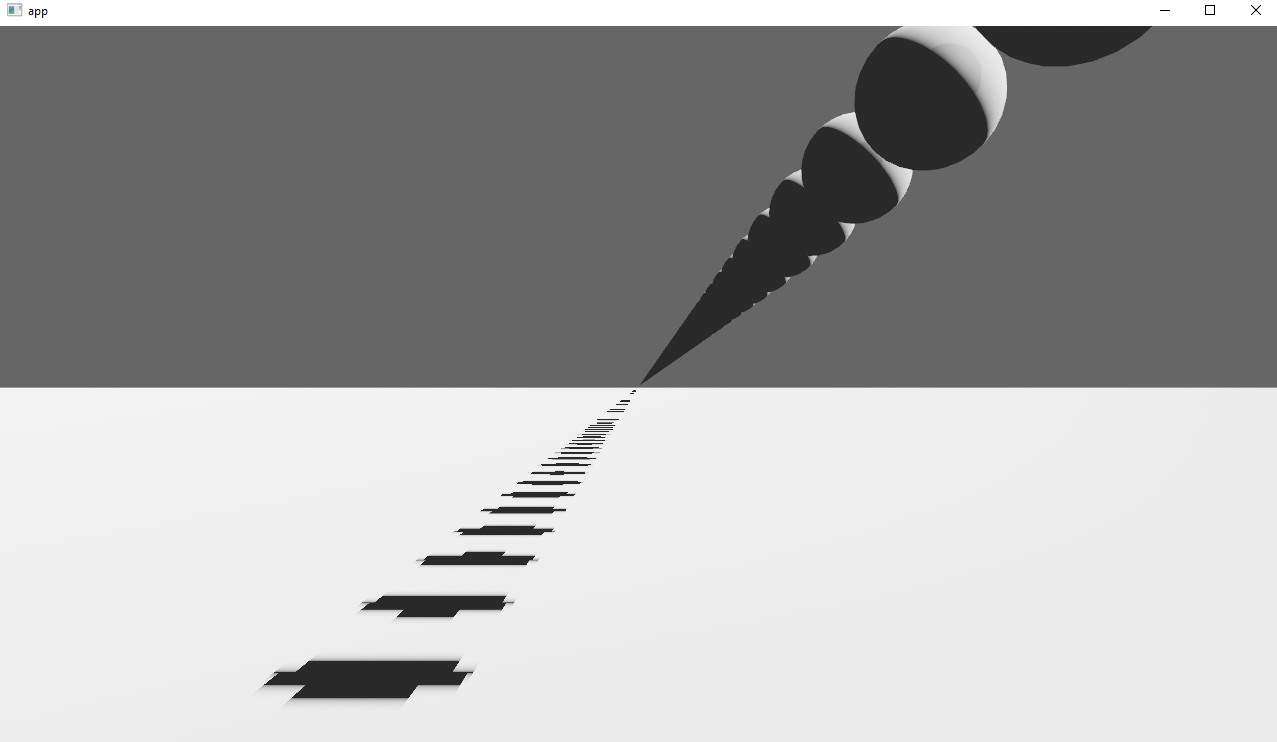 After 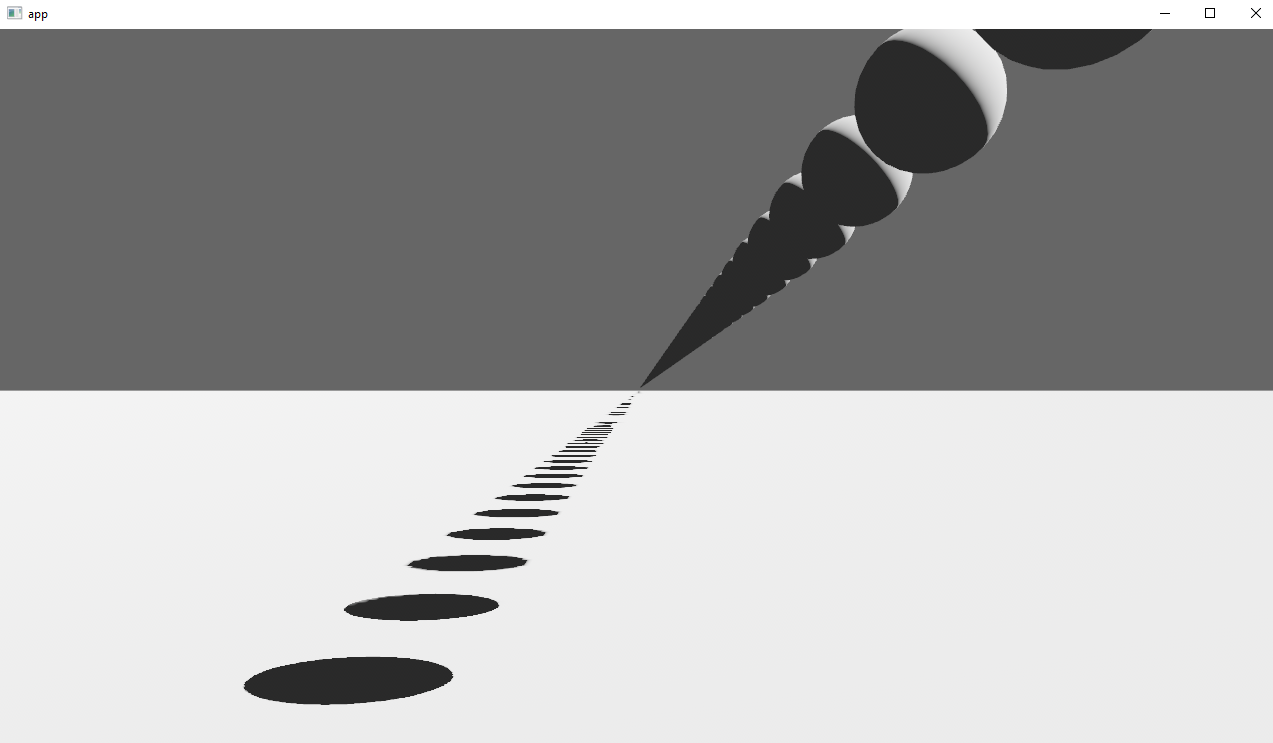 ## Solution Rather than rendering a single shadow map for directional light, the view frustum is divided into a series of cascades, each of which gets its own shadow map. The correct cascade is then sampled for shadow determination. --- ## Changelog Directional lights now use cascaded shadow maps for improved shadow quality. ## Migration Guide You no longer have to manually specify a `shadow_projection` for a directional light, and these settings should be removed. If customization of how cascaded shadow maps work is desired, modify the `CascadeShadowConfig` component instead. |
||
|
|
ddfafab971 |
Windows as Entities (#5589)
# Objective Fix https://github.com/bevyengine/bevy/issues/4530 - Make it easier to open/close/modify windows by setting them up as `Entity`s with a `Window` component. - Make multiple windows very simple to set up. (just add a `Window` component to an entity and it should open) ## Solution - Move all properties of window descriptor to ~components~ a component. - Replace `WindowId` with `Entity`. - ~Use change detection for components to update backend rather than events/commands. (The `CursorMoved`/`WindowResized`/... events are kept for user convenience.~ Check each field individually to see what we need to update, events are still kept for user convenience. --- ## Changelog - `WindowDescriptor` renamed to `Window`. - Width/height consolidated into a `WindowResolution` component. - Requesting maximization/minimization is done on the [`Window::state`] field. - `WindowId` is now `Entity`. ## Migration Guide - Replace `WindowDescriptor` with `Window`. - Change `width` and `height` fields in a `WindowResolution`, either by doing ```rust WindowResolution::new(width, height) // Explicitly // or using From<_> for tuples for convenience (1920., 1080.).into() ``` - Replace any `WindowCommand` code to just modify the `Window`'s fields directly and creating/closing windows is now by spawning/despawning an entity with a `Window` component like so: ```rust let window = commands.spawn(Window { ... }).id(); // open window commands.entity(window).despawn(); // close window ``` ## Unresolved - ~How do we tell when a window is minimized by a user?~ ~Currently using the `Resize(0, 0)` as an indicator of minimization.~ No longer attempting to tell given how finnicky this was across platforms, now the user can only request that a window be maximized/minimized. ## Future work - Move `exit_on_close` functionality out from windowing and into app(?) - https://github.com/bevyengine/bevy/issues/5621 - https://github.com/bevyengine/bevy/issues/7099 - https://github.com/bevyengine/bevy/issues/7098 Co-authored-by: Carter Anderson <mcanders1@gmail.com> |
||
|
|
c7791ad9b3 |
Organized scene_viewer into plugins for reuse and organization (#6936)
# Objective This PR reorganizes majority of the scene viewer example into a module of plugins which then allows reuse of functionality among new or existing examples. In addition, this enables the scene viewer to be more succinct and showcase the distinct cases of camera control and scene control. This work is to support future work in organization and future examples. A more complicated 3D scene example has been requested by the community (#6551) which requests functionality currently included in scene_viewer, but previously inaccessible. The future example can now just utilize the two plugins created here. The existing example [animated_fox example] can utilize the scene creation and animation control functionality of `SceneViewerPlugin`. ## Solution - Created a `scene_viewer` module inside the `tools` example folder. - Created two plugins: `SceneViewerPlugin` (gltf scene loading, animation control, camera tracking control, light control) and `CameraControllerPlugin` (controllable camera). - Original `scene_viewer.rs` moved to `scene_viewer/main.rs` and now utilizes the two plugins. |